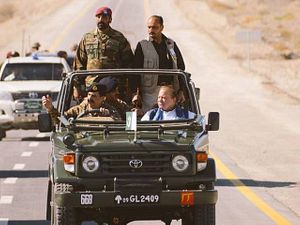Since the so-called Panama Papers revealed Prime Minister Nawaz Sharif’s family’s overseas financial dealings, the federal government of Pakistan, led by Sharif’s political party, Pakistan Muslim League (Nawaz), has been under severe pressure from its opposition. Sharif and his family have been directly implicated in this alleged corruption scandal. The nine-party joint opposition has rejected the government’s proposed plan to investigate the issue.
The opposition has presented seven questions of their own to the government and the government has refused to address them. The questions focus on the disclosure of Sharif’s family’s assets. Last week, opposition lawmakers staged a walkout from the National Assembly and the Senate due to the prime minister’s months-long absence from the parliament.
Moreover, the chief justice of Pakistan, a week ago, turned down the Sharif administration’s request to form a judicial commission to investigate the leaks. The Supreme Court, in a statement, said that under the existing constitutional rules, the proposed commission will be “toothless” and “will serve no useful purpose.”
The head of Pakistan Tehreek-e-Insaf (PTI), Imran Khan, has campaigned relentlessly against the government. A week ago, however, he admitted to owning an offshore company to evade U.K. taxes. While this disclosure significantly weakened Khan’s stance against the government, the situation has turned into a practical stalemate, with the opposition now warning of mass protests and civil unrest.
On May 16, Sharif, in his much-awaited appearance before the National Assembly, proposed the formation of a parliamentary committee to decide the terms of reference (ToRs) for an investigation. However, the premier, while speaking before parliament, carefully avoided the seven questions raised by the opposition, which deal with Sharif and his family’s business sources. Furthermore, Sharif didn’t discuss the details of his family’s properties in London, which were allegedly bought using offshore companies.
The government has failed to deliver any comprehensive plan, which might reflect a lack of sincerity and seriousness toward resolving this crisis. On the other hand, prominent lawmakers from the opposition have lost their own credibility due to their implication in similar offshore activities. Imran Khan, in particular, has drawn massive criticism over his involvement in offshore schemes.
The inflexibility being shown on both sides may force the military into action. Pakistan’s armed forces don’t want to see any political instability at a time when other larger security and economic interests are at stake. Reportedly, a week ago, the powerful chief of army staff, General Raheel Sharif (no relation to the prime minister), conveyed a message to Prime Minister Sharif, “asking him to resolve the Panama Papers issue at the earliest.” Dawn reported that “General Sharif believes that the issue is causing instability and insecurity.” Perhaps it was this warning from the military chief that brought the prime minister into parliament.
The military already controls all matters of strategic importance, including defense and nuclear weapons, and all aspects of national security and foreign policy. A weak civilian government in Pakistan suits the military. First, with the façade of civilian government, which is already on its knees, the military can run the country without taking on too much domestic and international criticism. Second, the military has already enough on its plate: the implementation of the China-Pakistan Economic Corridor (CPEC) and ongoing operations against militants across the country have increased the Army’s responsibilities. The only remaining thing that might be of the Army’s concern is the weak economy, which it has so far left to the civilian government while making sure its institutional needs are fulfilled.
While the military’s interests, as an institution, are better served with a weak civilian government, it doesn’t want to see Sharif’s weak government fall apart. That would force the military to fill the vacuum. At present, however, the popularity of the military is such that if a direct intervention was to take place today, the masses would largely support it.
Arguably, Prime Minister Sharif has accepted his weakened position vis-à-vis the military; the premier doesn’t want to try anything out of the ordinary that might cost him his government. Besides, he also wants an end to this crisis while not openly giving in to the opposition’s pressure and demands. Sharif is all focused on winning the next general election. The overall improved security situation in the country, better economic indicators, and massive infrastructure development due to Chinese investments may very well help bring back Sharif’s party into power at the next elections.
The opposition, led by Imran Khan, wants to maintain pressure on the government. Some of the opposition leaders might even support a coup if they are not likely to form a national government in the next general election and see the military’s intervention as their only way to have some say over policy. Two years ago, Khan’s party staged a major sit-in in the heart of Islamabad, openly calling for the military to intervene. Back then, the military wanted to weaken Sharif’s government; now, however, it doesn’t want an already fragile civilian government to collapse.
Whether direct or indirect, the military’s role may turn out to be decisive in breaking this deadlock among the quarreling political parties.
































